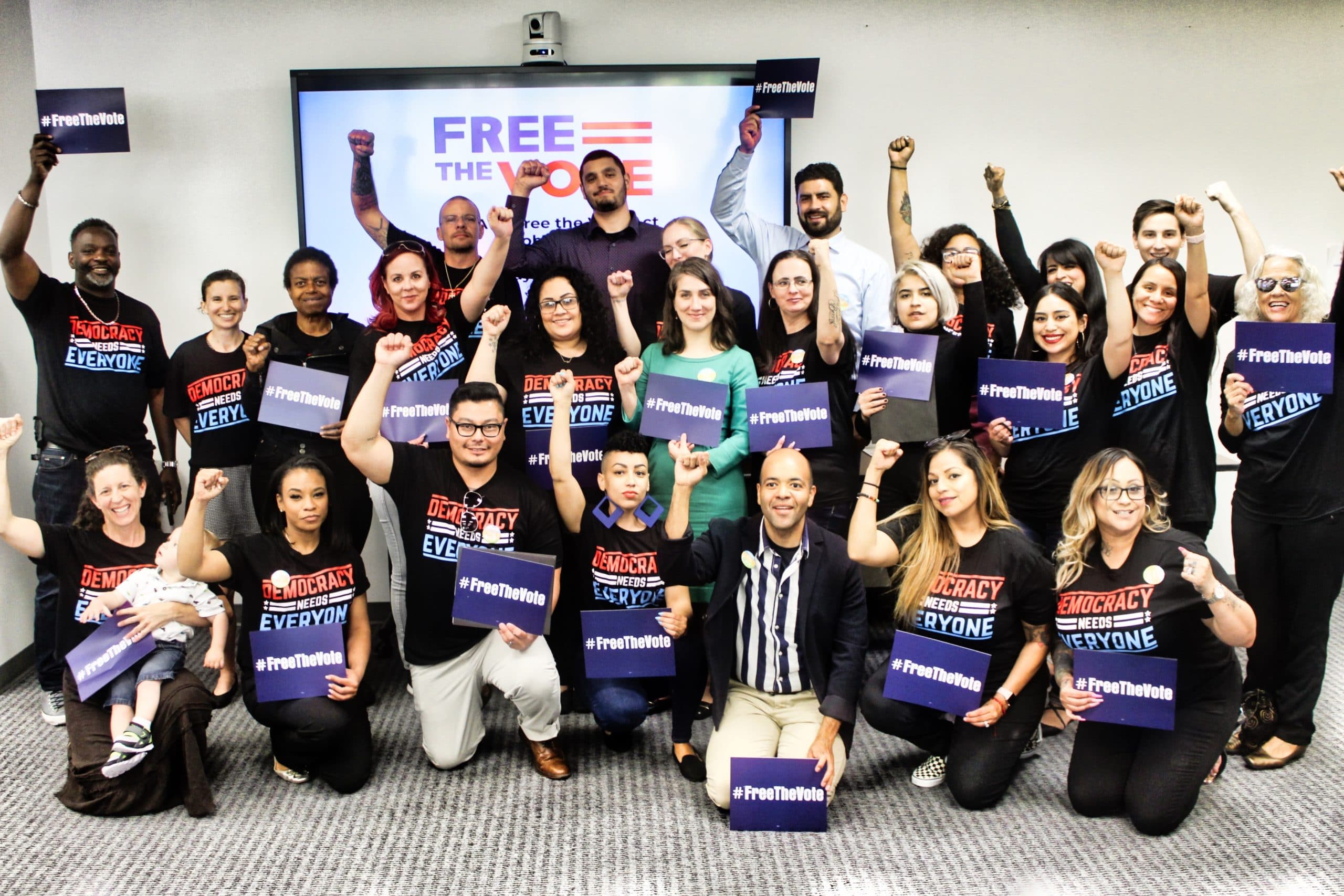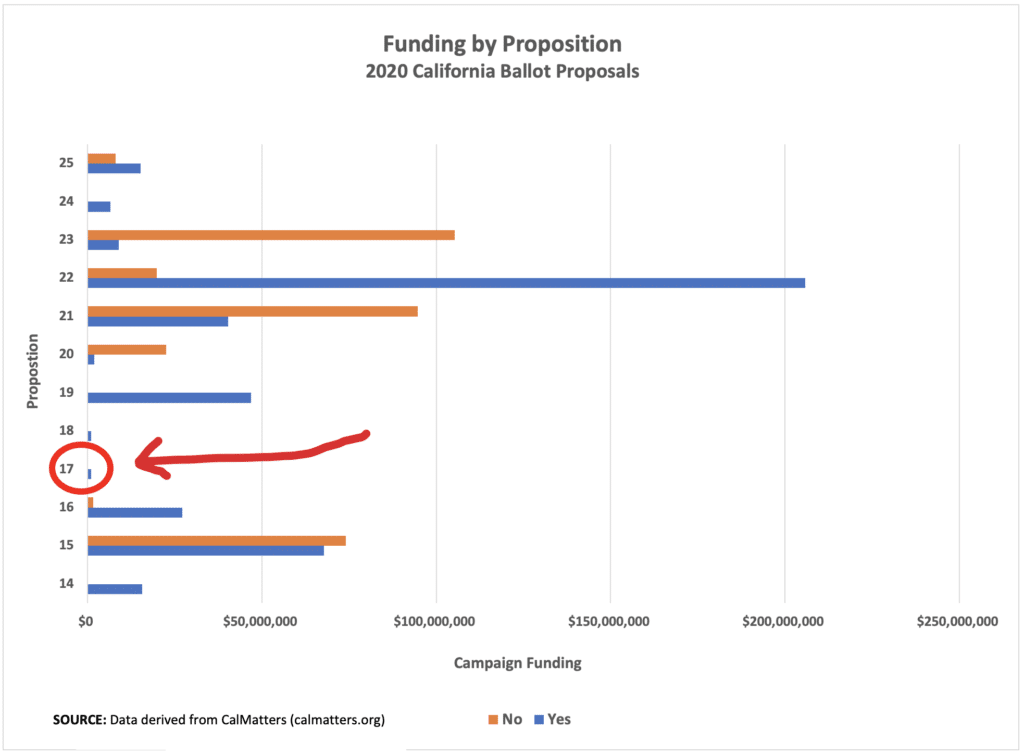
Estimates suggest the constitutional amendment will restore rights for 50,000 eligible parolees.
California voted in November to pass Proposition 17, the Voting Rights Restoration for Persons on Parole Amendment. The constitutional amendment passed with a 59% majority and amends the California Constitution to restore voting rights to formerly imprisoned individuals upon completion of a prison term, including those who are released early. The amendment took effect on November 11, 2020, five days after the secretary of state filed the Statement of Vote.
According to the Sentencing Project, 5.2 million people nationwide are not allowed to vote due to a felony conviction. While California does have a path to voting rights restoration for convicted felons, previous law required both prison time and parole be completed, thus making parolees ineligible to vote. Prop 17 amends two parts of the state constitution and restores voting rights to an estimated 50,000 people.
Amendment to California’s State Constitution
Prop 17 amended Section 2 and Section 4 of Article II of the California Constitution. The following highlighted text was added and struck-through text was deleted:
Section 2
(a) A United States citizen 18 years of age and resident in this State may vote.
(b) An elector disqualified from voting while serving a state or federal prison term, as described in Section 4, shall have their right to vote restored upon the completion of their prison term.
Section 4
The Legislature shall prohibit improper practices that affect elections and shall provide for the disqualification of electors while mentally incompetent or imprisoned or on parole serving a state or federal prison term for the conviction of a felony.
SOURCE: Ballotpedia
A Collective Campaign Effort
Prop 17 was introduced in the California legislature by Assemblymember Kevin McCarty (D-Sacramento) on January 28, 2019 as a resolution proposing a ballot initiative for a constitutional amendment that would restore voting rights to people on parole. After its approval by both the State Assembly and Senate, the initiative was placed on the 2020 general election ballot.
The campaign for Prop 17 was led by Yes on 17, a grassroots advocacy group that collaborated with other established organizations, including the ACLU of Southern California, Anti-Recidivism Coalition, the League of Women Voters in California, and others. Endorsements from celebrities such as John Legend, as well as from a wide range of media outlets, faith organizations, and student groups, also fueled Prop 17’s success.
Campaign funding totaled approximately $1 million. A quarter of that total came in a single donation from Patty Quillin, the wife of Netflix CEO Reed Hastings. Hastings and Quillins have also recently donated $120 million for scholarships at historically Black colleges and universities. Prop 17’s fundraising was only a small fraction – about one-tenth of 1% – of the $785 million raised for the 12 propositions on this year’s ballot, likely because there was no significant political activity opposing it, despite the California Republican Party’s announced opposition. By contrast, the more contentious Prop 22, which sought to change employment classification for app-based drivers from employees to contractors, drew significantly more organized fundraising for and against it. Its supporters raised $204 million, or about 26% of the total.

Making it Stick: Helping Ex-Felons to Understand Their Rights
While California is the most recent state to update felony disenfranchisement laws, several states have already made similar changes and can provide insight into the implementation process. As noted by Urban Wire, several post-amendment factors are pivotal in promoting voter registration among people whose voting rights have been restored. These include communicating clearly with now-eligible voters, implementing an automatic restoration process for voter registration, and limiting additional requirements for voting restoration, such as fine repayment or five-year waiting periods.
Colorado, which restored voting rights to parolees in 2019, instituted several requirements to educate parolees on their restored rights. The state now must provide voter information upon initial meetings with the division of adult parole, which includes:
- Information on voting rights
- Instructions on how to register and obtain registration materials
- Instructions on how to obtain and cast a ballot
By adopting similar practices, California can provide an implementation process that clearly communicates the new law and promotes voter literacy.
Current voter resources include the Secretary of State website, which allows individuals with criminal convictions to check their voter eligibility status and, if eligible, provides a link for registration. As of this publication, the website has not yet been updated and currently notifies parolees that they are not eligible to vote.
Initiate Justice, one of the lead organizations for the Yes on 17 campaign, has stated that they are working with the Secretary of State and county registrar offices to update the state and county websites to reflect recent changes. In addition, the organization is aiming to strengthen a Cal ID program with the California Department of Corrections and Rehabilitation that would ensure every person leaving state prison has an ID and automatic voter registration.
California can also learn from other states’ post-amendment challenges as well, most notably Florida’s contentious legal battle over new restrictions placed by the state legislature on restoration of felon voting rights. The legislature acted in response to the passage of a ballot initiative in 2018 that amended the state’s constitution to restore voting rights to an estimated 800,000 people. California’s Democratic Senate majority makes it unlikely that the new amendment will face a similar legislative or legal battle.
Correcting a Systemic Injustice
Disenfranchisement disproportionately affects Americans on the basis of race, class, gender, and state of residence, in addition to a combination of these and other factors. Black and Hispanic men are disenfranchised at far higher rates nationwide than their White counterparts. Disenfranchisement also disproportionately affects those who are completing correctional sentences but are not imprisoned. Research conducted by The Sentencing Project found that three-quarters of the total disenfranchised population are people who have either fully completed their sentences or are in the process of being supervised on probation or parole.
California now joins 17 other states that restore voting rights upon release from prison. The remaining majority of states allow some form of voter restoration with state-specific requirements, and eleven states took steps to restore felons’ voting rights to various degrees in 2019. Maine and Vermont are the only two states that allow prisoners to vote while incarcerated, although prisoners within the state still face voting challenges stemming from low literacy rates and reliance on volunteers to register inmates.
Looking to the Future
Felon voting rights are now part of the national discussion around voting and election processes, especially in regards to the importance of free and fair elections. Voter turnout in 2020 broke the record for the most votes cast in a US presidential election. With early voting for Georgia’s senate runoff happening now, narrow senate, gubernatorial, and congressional races have continued to reveal national interest in election races beyond general elections and have contributed to an increasing awareness of disenfranchisement, gerrymandering, voter suppression, and election security.
Solutions-driven organizations such as Initiate Justice and election officials, including Amber McReynolds and David Becker, have committed to a boots-on-the-ground approach to ensure that the process of voting is representative and effective. As McReynolds told The American Leader, “We have to make sure election policies and procedures are centered around who can vote and not who wins.”
Problem Addressed: Voting Rights
Written by Anna Luo
Published on December 29, 2020
Feature image: Courtesy of Yes on 17
Sources
“California Proposition 17, Voting Rights Restoration for Persons on Parole Amendment (2020)”, Ballotpedia, https://ballotpedia.org/California_Proposition_17,_Voting_Rights_Restoration_for_Persons_on_Parole_Amendment_(2020), accessed Dec 14, 2020
Chris Uggen, Ryan Larson, Sarah Shannon, and Arleth Pulido-Nava, “Locked Out 2020: Estimates of People Denied Voting Rights Due to a Felony Conviction”, The Sentencing Project, Oct 30, 2020, https://www.sentencingproject.org/publications/locked-out-2020-estimates-of-people-denied-voting-rights-due-to-a-felony-conviction/, accessed Dec 14, 2020
“What is Prop 17?”, Yes on 17, https://yeson17.vote/what-is-prop-17/, accessed on Dec 11, 2020
“ACA-6 Elections: disqualification of electors.”, California Legislative Information, https://leginfo.legislature.ca.gov/faces/billHistoryClient.xhtml?bill_id=201920200ACA6, accessed on Dec 11, 2020
“Endorsements”, Yes on 17, https://yeson17.vote/endorsements-3/, accessed on Dec 14, 2020
“California Proposition 17, Voting Rights Restoration for Persons on Parole Amendment (2020)”, Ballotpedia, https://ballotpedia.org/California_Proposition_17,_Voting_Rights_Restoration_for_Persons_on_Parole_Amendment_(2020), accessed Dec 14, 2020
“Meet the CAGOP Endorsed Candidates”, CAGOP, https://www.cagop.org/s/endorsements, accessed Dec 17, 2020
Ryan Menezes, Maloy Moore, and Phi Do, “Billions have spent on California’s ballot measure battles. But this year is unlike any other”, Los Angeles Times, Nov 13, 2020, https://www.latimes.com/projects/props-california-2020-election-money/, accessed Dec 11, 2020
“Voters with Convictions FAQs”, Colorado Secretary of State, https://www.sos.state.co.us/pubs/elections/FAQs/VotingAndConviction.html, accessed Dec 14, 2020
Gary Fineout, “Federal judges strikes down restrictions no Florida felony voting”, Politico, May 24, 2020, https://www.politico.com/states/florida/story/2020/05/24/federal-judge-strikes-down-restrictions-on-florida-felon-voting-1286097, accessed Dec 17, 2020
Nicole Lewis, “In Just Two States, All Prisoners Can Vote. Here’s Why Few Do”, The Marshall Project, Jun 11, 2019, https://www.themarshallproject.org/2019/06/11/in-just-two-states-all-prisoners-can-vote-here-s-why-few-do, accessed Dec 14, 2020
CCRC Staff, “CCRC reports on criminal record reforms in 2019”, Collateral Consequences Resource Center, Feb 17, 2020, https://ccresourcecenter.org/2020/02/17/ccrc-publishes-report-on-criminal-record-reforms-enacted-in-2019/, accessed Dec 17, 2020
Domenico Montanaro, “President-Elect Joe Biden Hits 80 Million Votes In Year Of Record Turnout”, NPR, Nov 25, 2020, https://www.npr.org/2020/11/25/937248659/president-elect-biden-hits-80-million-votes-in-year-of-record-turnout, accessed Dec 18, 2020
George Linzer and Mary Jane Gore, “Amber Reynolds: Making Voting Easier for All Americans”, The American Leader, Jul 27, 2020, https://theamericanleader.org/leader/amber-mcreynolds-making-voting-easier-for-all-americans/, accessed on Dec 18, 2020
Procon.org, “State Felon Voting Laws”, Britannica Procon.org, Nov 4, 2020, https://felonvoting.procon.org/state-felon-voting-laws/#new-york, accessed on Dec 23, 2020
Catherine Thorbecke, “Netflix CEO Reed Hastings and Patty Quillin donating $120 million to HBCUs”, ABC News, Jun 17, 2020, https://abcnews.go.com/Business/netflix-ceo-reed-hastings-wife-patty-quillin-donating/story?id=71302058, accessed on Dec 23, 2020
Have a Suggestion?
Know a leader? Progress story? Cool tool? Want us to cover a new problem?

